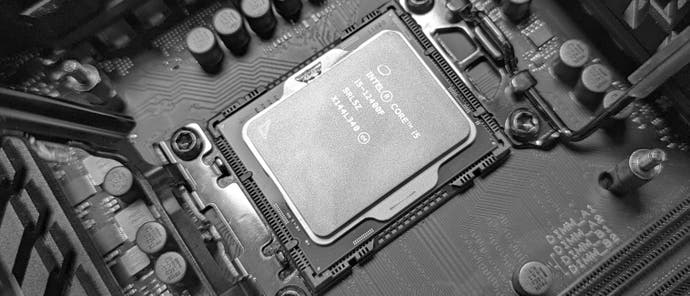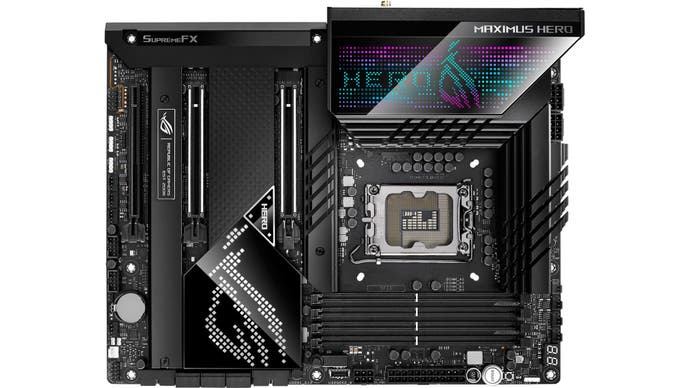Core i7 12700K and Core i5 12400F: the Digital Foundry verdict
12900K and 12600K gaming performance for cheap, more or less.
Following the conclusion of our testing, one thing is clear: the 12900K and 12600K are stellar CPUs, but the 12700K and 12400F do nearly as well while costing significantly less than Intel's top-end 8P-core and 6P-core CPUs.
On average across our eight game test suite at 1080p, the 12700K is 96 percent as fast as the 12900K - incredibly close. Meanwhile, the 12600K is 90 percent of the speed of the 12900K, and the 12400F is another cut behind at 82 percent the speed of 12900K. At each step down the ladder, you are losing measurable amounts of performance, but 12th-gen is extremely competitive compared to both AMD's Ryzen 5000 series and Intel's previous 11th-gen chips. In fact, the 12400F is only 3fps slower (~1 percent) on the eight-game average than the 11900K - now that's progress. In AMD land, the 12700K (96%) outperforms the 5950X (92%) by a decent margin, while the 12400F (82 percent) is pretty competitive with the 5600X (87 percent) while costing around $100 less.
We don't want to read too much into these average results, as different games, scenes and settings will change the calculus considerably, but based on our results Intel's full 12th-gen performs incredibly for the money. The lower-end CPUs are particularly appealing, as Team Blue looks to have made sensible cuts - lower clock speeds, smaller caches and fewer E-cores - without unduly impacting gaming performance. That's great to see.

One note of caution is that we test our CPUs with as few programs running in the background as possible, in order to get repeatable results. That means that we may get an idealised outlook of gaming performance, and the 12900K and 12600K with their higher E-core counts should cope better with more realistic scenarios where background programs like Discord, Chrome or OBS Studio are running. Still, given the price difference between these various CPUs - there is a $180 drop from the 12900K to the 12700K and a $122 drop from the 12600K to the 12400F - we still feel comfortable recommending the cheaper parts!
As well as providing similar gaming performance to their better-equipped brothers, the 12700K and 12400F also draw less power and therefore will produce less heat. That means you should be able to spend less on cooling equipment - fans, AIOs, cases - without ending up with a thermally-throttled or noisy PC. (If you're considering a trendy small form factor build, then opting for something like a 12700K or 12600K over a 12900K makes a lot of sense.) However, not all cooling equipment supports the larger 12th-gen socket out of the box, and 600-series motherboards remain expensive, so it's best to consider the full cost of a build rather than just looking at CPU performance per currency unit in isolation.

While we feel better informed about Intel's 12th-gen lineup following the conclusion of this testing, there are still a few unanswered questions we're planning to tackle in upcoming content. First, we've heard great things about the Core i3 12100 and 12100F, the cheapest members of the 12th-gen lineup, and we're keen to get these CPUs in to see how they perform in the most CPU-intensive games.
Secondly, we want to have a better idea of how DDR4 and DDR5 systems compare, and with the recent arrival of a DDR4 Z690 board at Digital Foundry HQ we'll be able to do proper apples-to-apples testing with the 12900K. Right now, our recommendation is overwhelmingly for DDR4 given its much lower asking price and wider availability, but perhaps that will change if we see strong DDR5 results in some titles.
All of that comes later though, so that'll do it for now. We'll catch you on the next one!
Intel Core i7 12700K and Core i5 12400F analysis
- Introduction, test rig and content creation benchmarks
- Gaming benchmarks: Flight Simulator 2020, Hitman 3
- Gaming benchmarks: CS:GO, Metro Exodus EE, Black Ops Cold War
- Gaming benchmarks: Cyberpunk 2077, Far Cry 6, Crysis 3 Remastered
- Gaming benchmarks: Memory bandwidth analysis
- Intel Core i7 12700K and Core i5 12400F: the Digital Foundry verdict [This Page]








